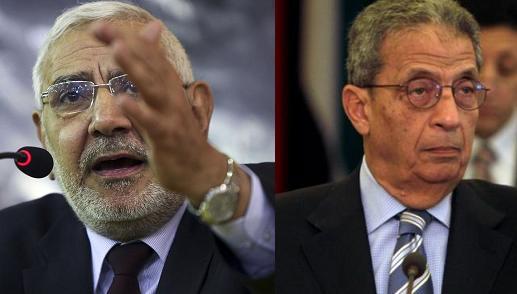Al-Ahram poll 28 April - 1 May: Moussa still ahead in Egypt's presidential race

In the weekly poll conducted by Al-Ahram Political Studies Centre between 28 April to 1 May, Amr Moussa, Mubarak's former foreign minister, is still Egypt's favoured presidential candidate.
Moussa received 39 per cent of votes in the poll.
Former Muslim Brother Abdel-Moneim Abul-Fotouh came second with 24 per cent.
Ahmed Shafiq, a former prime minister and air force chief, still held third place with 17.2 per cent, which is 5 per cent more than in last week's poll.
The Muslim Brotherhood's Mohamed Mursi jumped into fourth place for the first time with 7 per cent, outscoring Hamdeen Sabbahi.
Last week, Mursi received the only 3.6 per cent.
Sabbahi, the Nasserist candidate running on an independent ticket, dropped to 6.7 per cent.
Other presidential candidates:
Mohamed Selim El-Awa, the well-known Islamic thinker, received 2.9 per cent, falling from 5.7 per cent last week.
Abul-Ezz El-Hariri, the contender running on the Socialist Popular Alliance Party's (SPAP) ticket, and Khaled Ali, the leftist lawyer and activist, both received 0.9 per cent.
The poll showed that liberals are likely to vote for Moussa and Shafiq, who have together received around 50 per cent throughout the previous weeks of polling.
Islamist supporters are likely to vote for Abul-Fotouh, Mursi or El-Awa, who together accounted for 35 per cent of the votes.
The poll showed that 90-95 per cent of citizens were motivated to vote in the election. Other studies have shown that up to 40 per cent of voters are still undecided on which candidate to vote for.
Moussa led the race in the Upper Egypt governorates of Assiut, Qena and Sohag, which was consistent with last week's data.
The poll showed that Abul-Fotouh was the front runner in Port Said and Suez. Last week's poll showed him leading in Minya, Beni Suef and Fayoum governorates.
As for Shafiq, he led the race in the Nile Delta governorates of Menoufiya and Gharbiya.
Mursi had his best result in Daqahliya, where he polled 8.5 per cent.
The poll was conducted on a sample of 1,200 individuals through personal interviews. It is a representative sample of central governorates; excluding coastal governorates, such as North Sinai, South Sinai, Marsa Matrouh, Al-Wadi Al-Gadid and Red Sea governorates. These governorates excluded from the poll, however, represent less than two percent of Egypt's population.
This is the sixth presidential poll conducted by the Al-Ahram Political Studies Centre. During the polls first three weeks, Al-Ahram had no final list of candidates, so voters named their favourite candidate. In the fourth week, the poll was conducted with 23 candidates and in the fifth week the final list was reduced to 13 candidates, reflecting the nominees that were officially accepted into Egypt's presidential race.
Presidential elections will take place on 23 and 24 May, and the president will be named on 21 June after a runoff voting round, if necessary, on 16 and 17 June.









facebook comments